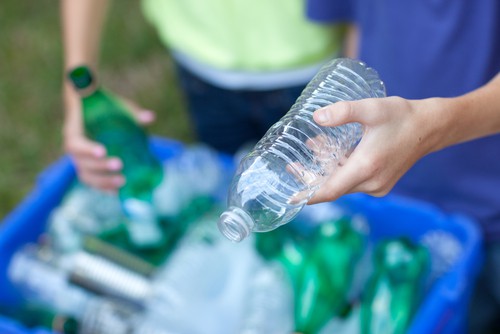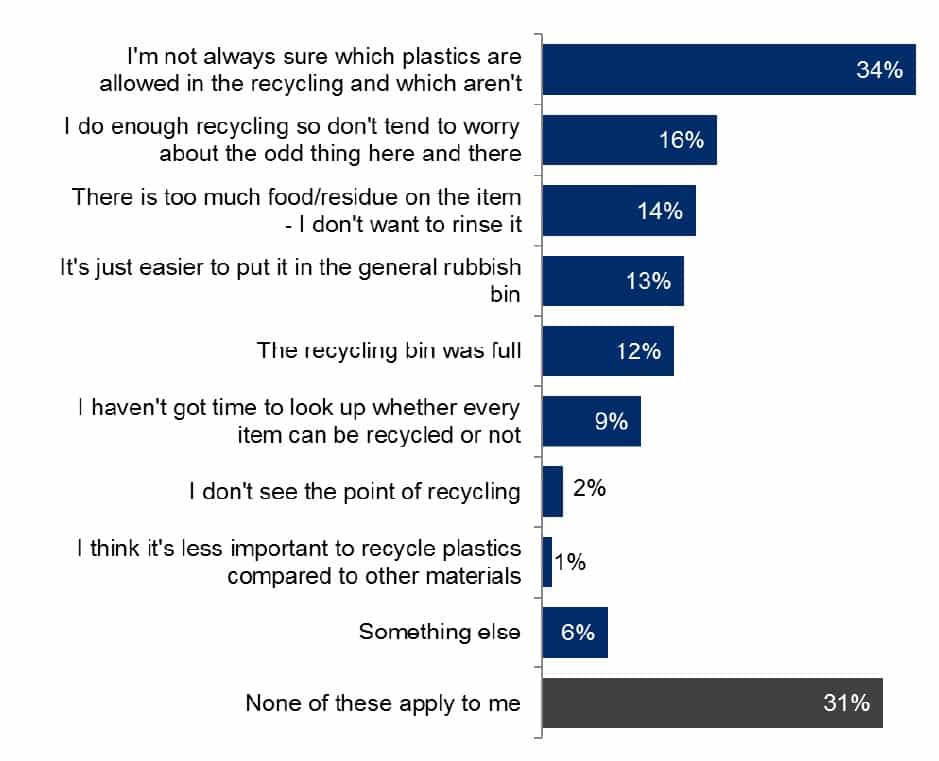The research, which included face-to-face and online surveys, suggested that the most common barrier to recycling plastic packaging remains uncertainty over which plastics can be recycled – an option cited by up to a third (34%) of respondents.

Backed by Recoup – the plastics recycling body which delivers the Pledge 4 Plastics campaign – and retailer Marks & Spencer, the research sought to understand consumer attitudes on waste and recycling, following on from similar consumer research conducted in 2014.
The survey found that almost four fifths of people (79%) refer to the on-pack recycling label (OPRL) when determining if an item is recyclable, with up to a third responding that they use the system for most items.
Other barriers to consumer recycling included 16% not worrying about discarding the odd item as they already feel they do enough recycling, or 14% not wanting to rinse packaging in the house.
Recoup claimed that the research adds further weight to arguments in favour of consistency of materials collected at the kerbside by local authorities.

Steve Morgan, Recoup technical manager, said: “Although consumer views change over time confusion about what can and cannot be recycled is seemingly as prevalent today as it was two years ago.
“This is reflected in the recent fall in the recycling rate in the UK. The role of OPRL in reducing consumers’ confusion can only be maximised by consistent collection of materials irrespective of where you live.”
Recoup has also suggested that communicating sustainable activities to consumers continues to be a challenge, with over 90% of those polled in the online survey suggesting that they were unaware of the term ‘circular economy’.
Design
Kevin Vyse, senior packaging technologist and innovation lead at Marks & Spencer, said: “The circular economy is here to stay and is going to be a major driver for packaging development over the next few years. Without understanding the consumer, giving them the incentive to recycle and supporting them via packaging information, there won’t be enough material to drive an effective circular economy.

“As one of the first retailers to introduce the on pack recycling label across all our packaging, we know it is an essential tool for customers in understanding what to recycle and how.”
One measure that has been suggested as a means of boosting recycling of plastic packaging is a consolidation of polymers used in products – something that Marks & Spencer has itself begun examining through a potential switch to a single polymer across its packaging line (see letsrecycle.com story).
Export
Another notable finding from the survey is the revelation that more consumers consider burning plastic for energy recovery acceptable than exporting it overseas for recycling with around 53% surveyed online and 45% in the face-to-face survey favouring energy recovery.
According to Recoup, as around two thirds of plastic packaging currently collected in the UK for recycling is processed oversees, ‘this is something that needs to be addressed’.
In its explanation of the findings, Recoup noted: “The Pledge 4 Plastics consumer study in 2014 found over 70% considered burning plastics for energy as an acceptable option, with less than half considering sending plastics to be recycled in other countries as acceptable. In these surveys although there was far less acceptance of burning plastics for energy (53% in the online survey and 45% in the face-to-face survey), it was still considered more acceptable than sending it to other countries (45% and 39% respectively). However, given that two thirds of UK collected plastics packaging is recycled overseas this is something that needs to be addressed.”
Related Links










Subscribe for free